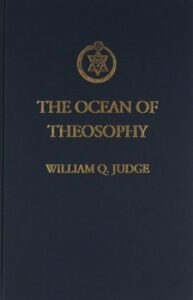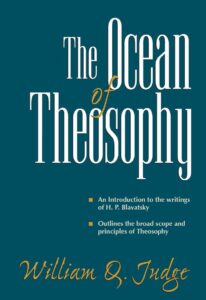Studies In The Ocean of Theosophy Part XXXIV
Theosophy Magazine
Vol. 3, No. 10 August 1935
pages 466 - 469
Part XXXIV
THEOSOPHY has fiery and quickening powers even for the listener who hears “with faith and not reviling”; while in the devotee the identical potencies represented in the formulations become aroused in the progress of time. Gradually, perhaps through the span of many lifetimes, unfamiliar powers are stirred into action, and inner perceptions — transcending those of the physical senses — are to be noted, so the Teachers state. The strangeness or the beauty of such sights and sounds tend to lure one to incautious lengths. For this realm is the “Hall of Learning”, wherein the “Soul will find the blossoms of life, but under every flower a serpent coiled”. Such an intermediate stage on the way to higher states of consciousness must necessarily be traversed — if wisely, yielding up much of value, but if unwisely, productive of evil. Hence the insistent warnings of all true Sages against the wiles and dangers of the astral plane.
These warnings, always needed by seekers of the Path of Knowledge, have significance today for all of Western birth; inasmuch as the present racial cycle and period of evolution must inevitably develop psychism in the peoples of the Occident, and particularly in America, where the new sub-race is forming and for which psychic capacities, now most mysterious to us, will be native. Doubtless, this natural cyclic development has been accelerated by the impact of the Theosophical Movement. However indifferent the general public may appear to be, the force of Theosophy is abroad, impelling the masses towards the point of choice between right and left. Thus the crying need for establishing sound bases for thought and true ideals for right action.
Accordingly, after setting forth Theosophy doctrinally, Mr. Judge finishes the “Ocean” by treating it as a system of Psychology. As such, safeguards are offered against the fallacies of the accepted schools as well as against alleged Western mysticism. At best, our so-called Psychology consists of the superficial investigation of minor functions and attributes of the mind with entire lack of apprehension of the un-plumbed depths beneath. True Psychology places little stress upon classification and permits of no dangerous experimentation with mental powers, but is the study of Man himself, and, in especial, of the laws and processes engaged in the movements of his consciousness, not alone on this plane, but in the inner departments of his being — departments still unrecognized by orthodox psychologists of the day.
Far from being a creature of flesh, possessed of a mind, Man, as held by the Masters of Wisdom, “is the highest product of the whole system of evolution, and mirrors in himself every power, however wonderful or terrible, of Nature; by the very fact of being such a mirror he is a man.” So approaching its study, Theosophy ever holds the integrity of the Soul inviolable. Based thus on moral fitness, its psychological investigation grants no intrusion into the mental privacy of the individual. This system holds no risks, since it confines itself to the presentation of principles, leaving each experimenter to gauge his own depths. Theosophy’s research consists of self-search: “Man Know Thyself” is its injunction.
The inadequacy of Western psychology results from its materialistic bias, enshrouding the whole established order of things. Recent years find Science less blatant in its ridicule of the metaphysical and the Church more discreet in her forbiddings; but there is little evidence that this attitude is more than expediency. Both institutions are subject to their public, in the last analysis. Some educators, it is true, do dabble in experimentation with mental and psychic phenomena, much to the detriment of all concerned — psychoanalyzing, “where angels fear to tread”, without any due respect for that greatest of mysteries, the Thinker, the Presence within.
The first innovation of the occult in this country came through the cult so mistakenly calling their teachings “Spiritualism”. Neither the contempt of Science nor the shocked protests of the Church served to drive this strange adversary from the arena. Multitudes witnessed its phenomena and attested their genuineness. Then came H.P.B. in mighty defense against the cult’s numerous defamers and giving corroboration of the validity of its phenomenal manifestations. But, more precious still were her scientific explanations of the phenomena. The defense was accepted, but the explanations rejected, together with H.P.B. herself, and the opportunity she so magnanimously offered. Thence, “Spiritualism” sank to the level of “spookism”, “without the slightest shadow of a philosophy” and, in its ignorance and degradation, wreaking “dangers and damages” upon the human instruments involved in them. If by remote possibility Spiritualism has accomplished any good at all, this is more than off-set by the harm, “in the opinion of those disciples of the Lodge who would have man progress evenly and without ruin along his path of evolution.”
The consequence of the whole Western situation is that it has no Psychology “worthy of the name”. As regards matters smacking of the magical, both disbelief and blind belief obtain — neither, profitable. Disbelief can not stop psychic action; nor can blind belief use it wisely. As the waxing cycle arouses the awful potencies of the astral realms, irresponsibility must become increasingly sinister. Protection lies in knowledge alone, in the intelligent understanding of human nature and of Man’s inherent “forces, laws, and powers”, of which the phenomena present valuable evidence.
Law is the natural order of action; action is the expression of force; force emanates from beings. That Man is the spiritual power-house of the Universe is a fact scarcely dreamt of in Western lands, but long recognized in the East, where may be seen exhibitions of his powers “which would upset the theories of many a Western man of science”. Perchance, when the occidental begins to cognize his innate greatness he will be more humble than he now is, in his great ignorance of Selfhood. For such cognizance involves the perception of a common Identity, and the common possession of attributes and capacities. Whatsoever is known or accomplished, every man of every race is potentially capable of the same. To think otherwise is to retard progress. The closed mind shuts the door in its own face.
Although Theosophy even now has gained but shallow foot-hold, yet its advent has wrought many changes. Even where hearts have felt it not, the impact of its living truth has broken mental moulds. Could it have remained uncontaminated, the attention paid to its merely intellectual concepts would have brought thousands by now to the discovery of the soul of the Teaching. But a dark shadow follows all constructive innovations. Soon, fragments of the Doctrine were snatched and used as nuclei for partial philosophies — labelled “original” and put forward for material gain and personal aggrandizement which invariably recommend practices opposed to the admonitions of the Teachers and are suicidal to spiritual unfoldment. A little concentration combined with a great deal of effrontery, made attractive by a smattering of mysticism, often serves to deceive even the learned and sceptical. These tangential lines are so much more appealing than the simple Path of sacrifice and service! In such ways, actual truths, purloined from the Wisdom-Teaching, become traps for the unwary — which is to say, the vast majority. How could people reared to believe all psychical powers to be necessarily fraudulent be other than unwary? Such unbelievers, once convinced and having no inkling of risk or of moral issues at stake, become ready prey to cult-ism.
In the East, incredulity is precluded by a familiarity with spectacular phenomena demonstrating human magical powers. Yet after concentration of the mind has forced the embryo in the seed to sprout, grow, flower and fruit in the space of a few hours; or the performer has risen “in the air unsupported, like a bird”; what is accomplished? It would seem wasteful to draw upon such high potencies for mere entertainment; but, as proof of Man’s innate creative capacities, any such performance might have value, especially if it were to shake some Western observer out of his complacency and convince him that he really has much still to learn.
The blindness of materialism is, in fact, a merciful provision of Nature. Note the alacrity with which self-styled instructors in “mind-reading” have sprung up, since its possibility has been established. There are advertisements of instruction not only in the reading of the mind, but also in how to gain control over it. But the Adepts deem it roguery even to look “into the secrets of another by means of this power”, since “it is an invasion of the rights of the other person” — indeed, a “felony”, heavily penalized by the great Law and the guardians of it, for which no bribery is possible. Understanding of this should go far towards safeguarding ethics and morals. Still, warnings are not enough; and until men embrace pure Philosophy and practice true Psychology, they “will not deem it wrong to commit felonies in fields where their weak human law has no effect”. What is true of the abuse of mind-reading is, of course, equally true of any other occult faculty.
The Eastern faquir, it is true, exercises his great powers — although purely psychic and secondary — without necessarily living a highly spiritual life; but this is the fading after-glow of his race’s glorious past, when these forces were generated by spiritual living. The East is like an aged man reverently brooding on the might and splendor that has been, while engaged in using what waning faculties remain to him. The West is like a callow youth, self-assertive and aggressive, who lays siege to anything appealing to his fancy, asking only, “Can I?” almost never, “Ought I?” But the youth must learn, and the old man re-incarnate to learn still more. When both East and West learn to hasten the growth of Altruism and to levitate desire and hold it high, both will come into the possession of powers now held in latency; but by neglecting the philosophical and scientific Doctrine of Unity, Law, and Brotherhood, they “put off the day when all may have these great powers for the use of all.”
Back to The Ocean of Theosophy



